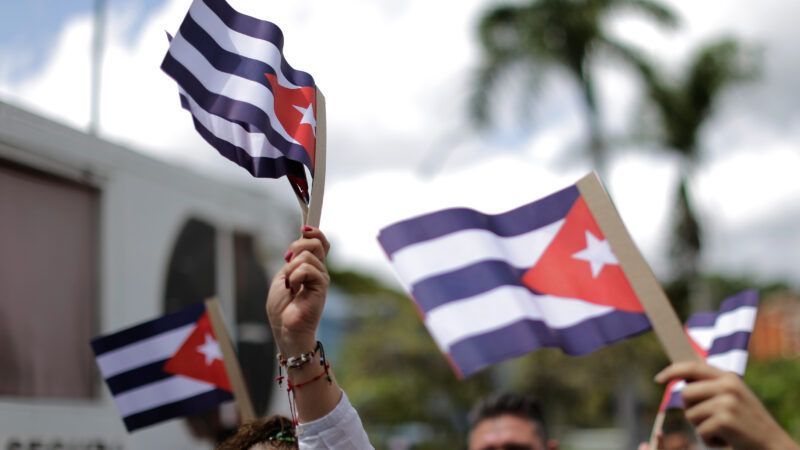The Trade Embargo Allows Cuba's Regime To Blame the U.S. for Communism's Failings
President Joe Biden says America "stands firmly" with the people of Cuba who oppose the country's oppressive regime. But he can do more than offer words of support.

After thousands of Cubans poured into the streets over the weekend to protest the island nation's communist government, President Joe Biden on Monday said America "stands firmly" with the people of Cuba.
The words of support for the anti-communist protesters—some of whom waved American flags as they demanded "freedom"—are good, but actions would be better. Biden should call on Congress to lift the United States' decadesold trade embargo with Cuba.
Despite being in place since 1962, the trade embargo has plainly failed to accomplish its primary goal of toppling Cuba's regime. If anything, the policy has likely bolstered the regime by allowing the communist government to blame the U.S. for its own economic problems, as Cuban President Miguel Díaz-Canel did on Sunday. The trade embargo has contributed to the Cuban government's impoverishing of millions of Cubans while limiting Americans' economic freedom, too. That it remains in place nearly three decades after the fall of the Soviet Union shows that America's foreign policy towards Cuba has failed to learn the primary lesson of the end of the Cold War: Economic freedom is the best weapon to aim at communism.
The protests against the Cuban government were prompted by shortages of food and COVID-19 vaccines. In a statement, the White House said the protests that broke out over the weekend were a "clarion call for freedom and relief from the tragic grip of the pandemic and from the decades of repression and economic suffering to which they have been subjected by Cuba's authoritarian regime."
Yes, Cuba's government is authoritarian, but there should be no mincing of words about this. Communism is what broke Cuba. The authoritarianism on display is merely the natural evolution of communist regimes—a pattern of economic and political repression that has been tragically repeated in too many corners of the world during the past century.
Biden's statement is right to conflate the lack of economic freedom with long-running political repression in Cuba. That's exactly why America's trade embargo is such a backward strategy, one that assumes economic and political freedom aren't fundamentally linked.
Look at what happened when the Obama administration loosened some of the rules banning Americans from traveling to Cuba as part of an effort to reestablish diplomatic relations. Even with the trade embargo still in place, that slight policy change helped create a boomlet of entrepreneurship amid then-Cuban President Raul Castro's thawing of tight state control over private businesses on the island.
While official figures on Cuba's private sector economy are understandably difficult to come by, a Brookings Institution report published in 2017 estimated that that 40 percent of the Cuban workforce had at least "one foot in the private economy."
Since taking over as Cuba's president in 2018, Díaz-Canel has cracked down on Cuba's private sector. Former President Donald Trump helped him smother the nascent economic reforms by reversing some of Obama's attempts to normalize U.S.-Cuba relations and by slapping new economic sanctions on Cuba just before leaving office in January.
Advocates for maintaining the embargo against Cuba argue that increased trade and tourism would enrich and strengthen the communist regime while failing to aid most Cubans. This was basically Trump's approach—one that reflects longstanding hardline conservative views about how to handle the communist state just 90 miles from the Florida coast. "There is zero reason to delude ourselves into believing that 'engagement' will get the tyrants in Havana to change their ways," Sen. Marco Rubio (R–Fla.) wrote in January.
This is a clever misdirection. Where is the evidence that disengagement is working? The embargo has been in place for nearly six decades. How much longer should we wait? How much longer should the people of Cuba have to wait?
"By insisting that political reforms precede economic openness, the United States forecloses the most realistic road to progress—and by speechifying about the necessity of regime change, American politicians lend credence to the Cuban government's anti-American propaganda," Reason's Stephanie Slade wrote in 2017 after returning from a trip to Cuba where she witnessed some of the consequences of the Obama administration's thawing of economic and diplomatic sanctions—as well as a lot of the consequences of decades of communist control over an economy.
As the people of Cuba strive to cast off their communist oppressors, the United States can do more than simply offer words of support. Undoing Trump's restrictions on the remittances that many Cuban Americans send to their families still trapped under the communist regime would be a great place to start.
If Biden were to reinstate Obama's travel and economic policies toward Cuba and call on Congress to end the failed trade embargo, it would be unlikely to immediately change the reality on the ground in Havana. But it would signal to the Cuban people—and to the country's potential future leaders in the event of a full-scale toppling of the regime—that the United States is prepared to let trade and tourism serve as vital economic and political lifelines for the island's long-suffering residents. And it would remove one excuse the Cuban government routinely uses to dismiss the failings of communism.


Show Comments (155)